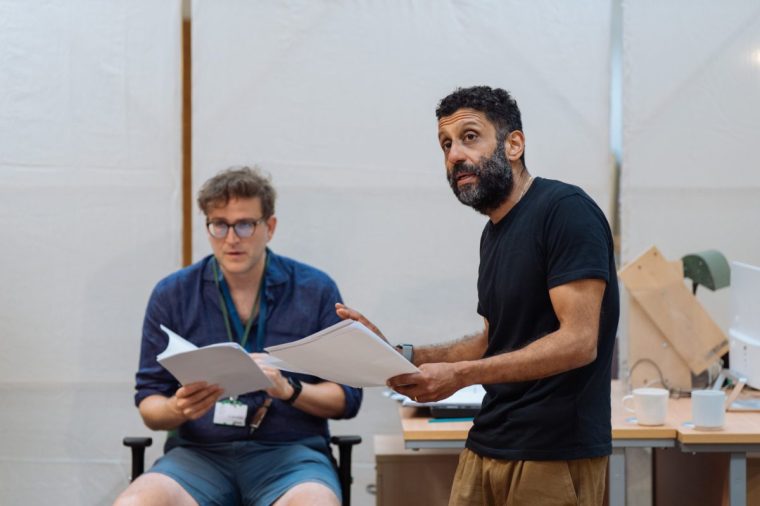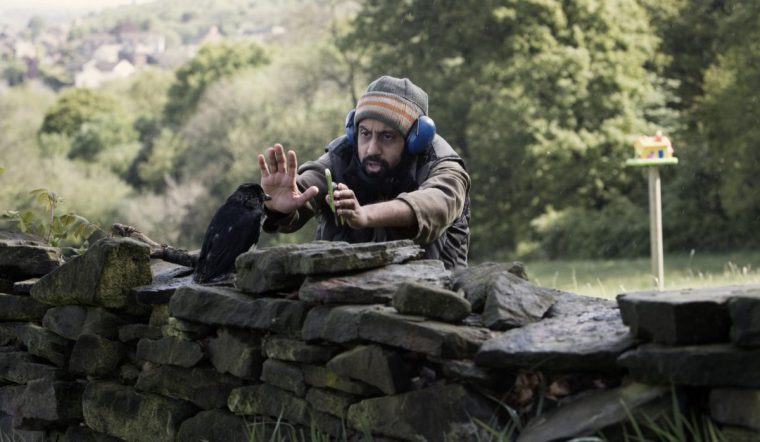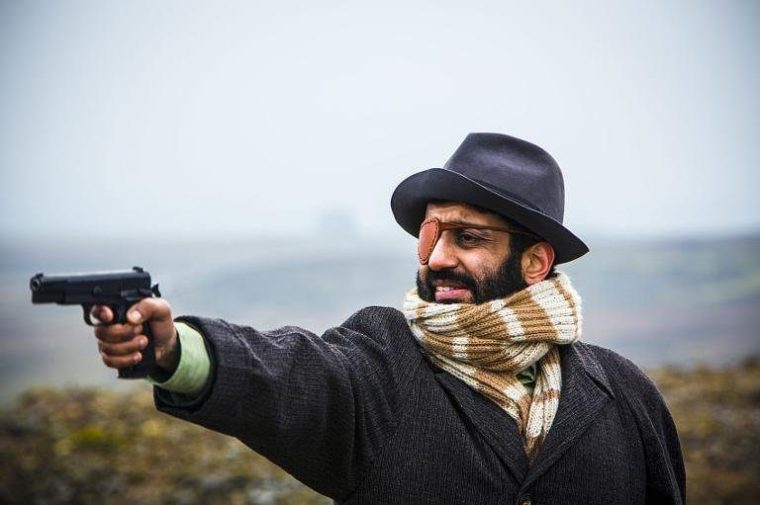Adeel Akhtar is an excellent advertisement for the character-building quality of uphill struggle. His parents were less than thrilled by his determination to follow a path as unpredictable as acting, and for several fruitless years it seemed like they had a point. He began to ask why he was getting so little work: was it because there were scant opportunities for British Asian actors or was it his own shortcomings? “The struggle was so fraught,” he says now.
He was 30 by the time he finally got noticed as one of the hapless terrorists in Chris Morris’s 2010 satire Four Lions, but since then he’s figured in so many the UK’s must-see shows, from Utopia and Killing Eve to The Night Manager and Black Doves, that he’s like a kitemark of quality. He’s won Baftas for 2016’s Murdered by My Father and 2022’s Sherwood, plus an Emmy for the Netflix fantasy drama Sweet Tooth. Now he’s in rehearsals at the National Theatre for Shaan Sahota’s new play The Estate – his first top-of-the-bill stage role. Retracing his steps for me is giving the 44-year-old a healthy dose of perspective.
“It’s nice to be reminded of it,” he says thoughtfully. “If it gets a bit taxing or fraught, I remind myself that there was a point when none of this was on the cards.”

Akhtar is dressed for the hottest day of the year, in a pink T-shirt, shorts and a baseball cap that he picked up in New Zealand while filming Sweet Tooth. By his own admission, he naturally tends to look tired and dishevelled. Those lugubrious eyes are surely one reason why his characters inspire sympathy even when they do terrible things. He appears especially beleaguered on the poster for The Estate, tugged in all directions by grasping, disembodied hands. His character, Angad Singh MP, is a man in crisis, running to be leader of the Opposition while wrangling with his sisters over his father’s will.
“It’s an interrogation of politics with a Big P and a little p,” Akhtar explains. “Power dynamics within the corridors of Westminster and power dynamics within the home. Maybe problematising the idea of what it means to be British Asian. It’s a type of story that’s never been presented before.”
This is the first production of a debut play so every decision is new and consequential. “I’ve never been a part of new writing like this before,” he says, biting into a frugal Pret lunch of boiled eggs and spinach. “It’s really exciting because you’re on the frontiers of not knowing.”
Akhtar loves not knowing. In Four Lions and Utopia, he played frustrated, powerless men who were desperate to make a mark on a world that didn’t know they existed. Now he’s playing men of influence like Angad and the prime minister in Black Doves. But really, he says, they’re all in the same boat.
“Whether you’re playing a prime minister or a disillusioned terrorist, you’re looking out on the world and trying to make sense of it. The idea of working something out is momentary, and then you fall back into the chaos and mess of being in the world.”

The Estate enables Akhtar to draw on his own experience as the son of Muslim immigrants from Pakistan and Kenya. He likes to juggle colour-blind roles like Inspector Lestrade in the Enola Holmes movies with culturally specific ones like the father who commits an honour killing in Murdered by My Father. Remarkably, that drama made him the first person of colour ever to win the Best Actor Bafta. As someone who had been inspired by British Asian pioneers like Hanif Kureishi (The Buddha of Suburbia) and Gurinder Chadha (Bhaji on the Beach), this milestone produced mixed feelings.
“I was really grateful but it raised a lot of questions as well,” he says. “We’ve been around for ages but these firsts are happening now. Well, why?” He lets the question hang. “What was the context we were in for those things not to have happened earlier? And are we still in the shadow of those things now?”
Akhtar was born in Hounslow in 1980 because his parents both worked (and indeed met) at nearby Heathrow Airport. When they moved to Buckinghamshire, they sent him to boarding school in Cheltenham – the kind of privilege that comes with great expectations. (He sends his own sons, eight and six, to state school.)
“Whether it was overtly said or not – and sometimes it was overtly said! – they invested emotionally and financially to make sure that my life would be better than the lives they had experienced,” he says. “And that does come with a certain pressure. Luckily quite early on I found the thing that I really wanted to do. I think if I hadn’t found acting, that pressure could have turned in on itself.”
His father, a senior immigration lawyer, took some persuading. He made Akhtar complete a law degree at Oxford Brookes University before giving him the green light to study drama at New York’s Actors Studio. Akhtar is the only one in his class to have achieved a career in acting so, he concedes, his dad was “completely right, statistically” to be worried.

It was 2002 when Akhtar enrolled, not long after 9/11. As soon as he arrived at JFK, he was handcuffed and searched, then taken away and interrogated for several hours, all because he vaguely resembled a terror suspect on a watchlist. His treatment was so outrageous that it made the news at the time. So it must have been weird when he got his first screen credit playing one of the actual hijackers in the docudrama Let’s Roll: The Story of Flight 93? “Now we’re talking about it, it was a strange thing,” he reflects. “But when you’re doing it, you’re just doing it. The overall feeling was just getting through it.”
Even failure, he says, was more satisfying than his law degree. “I remembered poring over contract law and conveyancing and thinking, ‘I’d give anything for somebody to just give me three lines to audition with.’”
But as the years went by and the novelty wore off, the doubts mounted. At one point, he lived in a camper van (albeit quite a nice one) to save money. “I don’t know why I didn’t take the easy route and go back to a law degree,” he ponders. “I wonder about that a lot. There was something about who [my parents] were: failure wasn’t an option. They had the will and the drive to make their lives better and their children’s lives better. So when I approached acting I thought, ‘Well, I’ve just got to make this work.’”
His long-awaited big break in Four Lions was a close-run thing. Despite his love for Chris Morris, he had second thoughts about playing another terrorist. It was the involvement of his contemporary Riz Ahmed that clinched it. “He was the guy I was always bobbing around with,” he says fondly. “He was always outspoken. He had his eye on British Asian representation. We’ve seen each other’s careers grow.”

Another turning point, in 2013, was Akhtar’s Bafta-nominated turn as conspiracy theorist Wilson Wilson in Dennis Kelly’s cult drama Utopia, moving from bumbling eccentricity to dangerous conviction over the course of two seasons. “That part reaffirmed what I thought I could do as an actor,” he agrees. “It was a bit serious but a bit funny. That was always the space I wanted to be in.”
Almost a decade ago, Akhtar moved to the US to play a paranormal investigator in the sitcom Ghosted and see if the opportunities were better there, but he soon came home. “It was all right,” he shrugs. “We didn’t have a great time. An older actor told me it’s good to dig where you stand. There’s something unique about British culture that I love.”
Over the past 20 years, he’s experienced first-hand how much British culture has changed, at least on television. “I could talk for ages about it,” he says, smiling. “It’s a super-exciting time. I can think about a time when the TV I was watching was lazy or derivative or just playing out certain tropes. I think people now have more of an appetite to see the British Asian experience in all its facets and nuances.”
Despite the tedious right-wing backlash – newspapers screeching about diverse casting, politicians dictating who is and isn’t truly British – he feels “very encouraged and optimistic about where we’re heading. A very good story quietens down all the dissonance and the noise around it.”
After The Estate finishes in August, Akhtar is visiting Kenya with his mother and his wife, the documentary director Alexis Burke. His mum’s story has been on his mind recently because he and Burke are writing a screenplay that intertwines his parents’ experiences as immigrants in the 60s with his own as a young man puzzling out his identity. As a father himself, he can better understand why his parents made the decisions they did.
“They saw their role as to protect me from the unnecessary hurt and struggle that they had,” he says. “So they did their best. It’s the same thing for me with my kids: we’ve been through this so you can be free to follow wherever your curiosity takes you. And keep going until you’re happy.”
‘The Estate’ is at the National Theatre, London, from 9 July to 23 August (nationaltheatre.org.uk)
